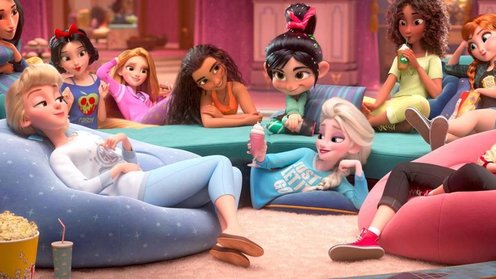C+ | Video game characters scour the internet for a replacement arcade part. Directed by Rich Moore and Phil Johnston Starring John C. Reilly and Sarah Silverman Initial Review by Jon Kissel |

However, the arcs are not so strong that they can sustain a script that’s far less funny than it needed to be. Rich Moore returns to direct with the greener Phil Johnston, and for the former to make a hacky film is depressing. Moore broke into animation directing on the early years of the Simpsons. He’s got his name on some of the best episodes, which therefore makes him partially responsible for some of the best 22 minutes of TV in the medium’s history. Wreck-It Ralph and Zootopia, which he also directed, both sustained a lot of visual humor, which makes the lack of any real laughs in Ralph Breaks the Internet shocking. Ralph is complimented on his dad jokes at one point, but the whole film is dad jokes and instantly dated slang and hand gestures. The only chuckles are generated by the actors who make unfunny lines funny with their inflection. Reilly, Silverman, and Hader are practiced pros, especially Reilly who can make the repetition of the word ‘boy’ into comic gold. With that level of ease, imagine what they could do with a script that actually had jokes in it.
The sour taste that Ralph Breaks the Internet left me with could be an outgrowth of how I’m feeling about big-budget filmmaking on the one hand and Internet consolidation on the other. The blockbusters of 2017, particularly Infinity War, broke me for superhero movies, because I don’t think the strings have ever been so apparent. The relationship between art and commerce is tenuous at best for summer tentpoles, and the veil was fully punctured in a way that made me feel like a pig at the trough. I also read several articles over the course of the last year that called for the break-up of the largest tech companies, coupled with the constant trickle of all the lies that companies like Facebook are now being caught in. Ralph Breaks the Internet is at the nexus of these two phenomena, and it has nothing to say about any of it, but then, how could they get those logos if anything negative was said about the company that owns them?
Marketing isn’t only about ads telling the consumer what to buy; it’s moreso about creating a feeling around a brand. Jokes in a Doritos ad associate that laugh and its attendant good feelings with Doritos, even if the laugh has nothing to do with cool ranch. Seeing Disney in control of all these properties and splashing all these tech logos in the cheerful and polished package of Ralph Breaks the Internet is a naked marketing ploy, especially when paired with how helpful and benign and straightforward everything is shown to be. Sure, people are jerks in the comments, but that’s just cruel loners and not behemoth institutions monetizing your eyeballs. I’ve talked about how when a film isn’t being entertaining, it creates a space that can be filled with other things. In Ralph Breaks the Internet, I filled the dead-joke space with resentment at the growing monopoly who created this film and the others who benefited from its existence. At least Hader said his sidekick’s name in a funny fashion. C-
 RSS Feed
RSS Feed